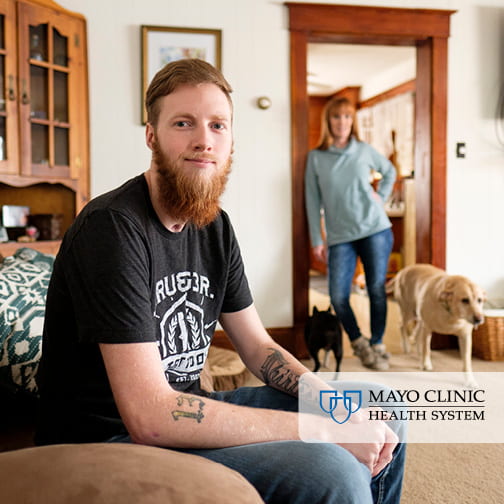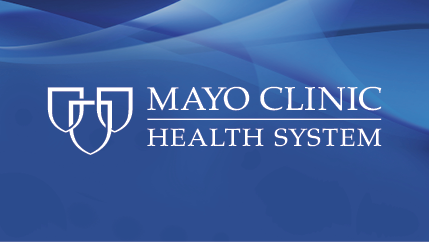Recent Posts
-

-
 Patient StoriesA lifesaver saved: An EMS veteran’s journey from rescue to recoveryNovember 14, 2025
Patient StoriesA lifesaver saved: An EMS veteran’s journey from rescue to recoveryNovember 14, 2025 -

Breast reduction surgery leads to pain relief, new outlook

For many women, buying their first bra was a significant milestone. For Karlie Schmidt, this milestone came early in life and before many of her peers. She began developing breasts at a young age and was wearing bras by 10.
"By fifth grade, I was wearing a bra every day," she says. "It was always something that bothered me."
By high school, Karlie was wearing bra size DDD, and she found it challenging to exercise or find clothing that fit correctly.
"I was in dance my entire life. It was hard for me to find costumes that would fit or that I could make work with a bra," says the 23-year-old Eau Claire, Wisconsin, resident. "It was also very difficult to find regular clothing that fit me correctly, and exercise was hard."
Her inconvenience eventually led to pain. As Karlie started college and spending hours in front of a computer screen, she began experiencing back, neck and shoulder pain due to her breast size.
She talked with her primary care provider, Jessica Day, a Family Medicine nurse practitioner at Mayo Clinic Health System in Eau Claire, about her concerns. Jessica referred Karlie to physical therapy, which helped for a while. But her pain and discomfort soon returned.
"Jessica told me that surgery may be an option and recommended that I schedule a consultation," says Karlie.
Karlie began researching procedures, and she discovered that breast reduction surgeries are fairly common, with over 43,000 procedures each year in the U.S. A self-described Type A person, Karlie also researched Yvonne Pierpont, M.D., a Mayo Clinic Health System plastic and reconstructive surgeon, and she liked what she read.
"I read the webpage and saw her work, so it was a no-brainer for me to get a consultation," says Karlie. "I came with four pages of questions. Dr. Pierpont answered every single question that I had. She really put me at ease, and I really liked her willingness to answer every single question."
Dr. Pierpont was happy to oblige.
"Many of the medically necessary and cosmetic procedures that we perform have great benefits but also potential downsides. I think it is important for patients to consider these options, and we work together to make good decisions," she says. "My job is to help them through the process, and make sure we get there as safely and with the best results that we can."
After an exam and discussion, Dr. Pierpont felt confident that a procedure could reduce the size of Karlie's breasts from a DDD to a B or C cup.
"Given her height, weight and breast volume, this was a reasonable reduction, so she would still have good breast volume for her body size," says Dr. Pierpont. "Karlie was a good surgical candidate because she had already tried medical management of symptoms, including weight loss, without resolution. She was at a safe weight and health status to undergo the surgery."
This was exactly what Karlie was hoping for. After her insurance company approved the procedure, Karlie decided to move forward.
"While I was deciding, I kept reminding myself that I don't need to be uncomfortable in my body due to something completely out of my control," says Karlie. "Modern medicine is here for a reason, and there's no shame in utilizing it to look and feel your best."
In June, Karlie was scheduled for surgery.
"I was so nervous that morning," recalls Karlie. "Everyone was so helpful and tried to keep me calm. I asked the anesthesiologist to hold my hand until I was out, which she did. It was so nice."
During the surgery, Dr. Pierpont made an anchor-shaped incision in each of Karlie's breast to remove excess tissue. Approximately 1.2 pounds of tissue per side were removed, and her cup size was reduced to a B/C.
After surgery, Karlie went home to recover. She credits her mother and boyfriend for helping her during that time.
"After the first week, I was able to finally take a shower," says Karlie with a laugh. "You wouldn't think it would make such a big difference, but it does. I felt so much better."
Similar to other surgical patients, Karlie had restrictions for six weeks, including no aerobic activity and lifting limits. However, she was able to return to work after two weeks. She began to "integrate back into society" by taking short walks around her home.
Karlie had regular follow-up appointments with Dr. Pierpont and her teams in the clinic to ensure her incisions were correctly healing. She praises the entire team, especially Jocelyn Koehler, a Mayo Clinic Health System nurse.
"She was so kind and supportive throughout my entire surgery journey. Her support truly made all the difference for me," says Karlie.
Soon she was feeling much better, and noticing significant improvement in her back, neck and shoulder pain.
"My body doesn't hurt as much and my clothes are fitting better," says Karlie. "Every single issue I had before is gone. I feel like a new person."
Dr. Pierpont says that Karlie's experience is similar to many others.
"Patients often say this is life-changing. While not all patients have improvement to all symptoms, most notice improvement, even when initially bruised and swollen after surgery," Dr. Pierpont says. "Breast reduction surgery is a major surgery, and there considerations, including postoperative time and potential for complications. However, patients often are very satisfied with the results."
One benefit that Karlie was not expecting is her willingness to share her experience with others.
"I have noticed a lot that I feel so much more open about my body," she says. "I'm an outgoing person, and I realize that our bodies don't need to be a taboo subject. I'm just much more comfortable with talking about these things with others."
Karlie offers three pieces of advice for women who are considering a breast reduction surgery.
"First, do your research. It helped me feel a lot better going into it because I knew exactly what to expect," she says. "Second, find a surgeon who is comfortable with you, and willing to answer all your questions and put you at ease. And third, make sure you feel 100% confident in your decision because you can't go back."
That's good advice for all.


